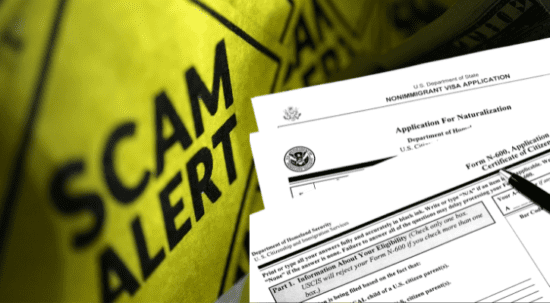This page is updated weekly. Newer information is highlighted.
Topics: How to stay safe & be prepared | Raids & deportation | Refugees | Asylum | Green Cards & visas | TPS | Humanitarian parole | Travel ban | DACA | Citizenship | Public benefits & public charge | Work permits | Immigration registration | U.S. and Mexico border | Technology & privacy | Other changes
Raids, detention, and deportation
Recent immigration changes are affecting how immigration enforcement works across the United States. ICE is increasing activity in more communities, with some areas seeing targeted operations.
More people are being detained, including some people with legal status. Many are being held in detention for longer periods and under unsafe conditions. The government is also using faster deportation processes.
See our guides for current updates:
- ICE raids and enforcement: Learn where ICE is showing up, who is most at risk, what your rights are, and how to create a safety plan for yourself and your family.
- Immigration detention: Learn what detention is like, your basic rights in detention, and how to find help if you or a loved one is held by ICE.
- Deportation and immigration court: Learn what happens after a Notice to Appear, how immigration court is currently working, and steps you can take to prepare for your case.
Refugee changes
The U.S. Refugee Admissions Program (USRAP), which allows refugees to resettle in the U.S., has been suspended indefinitely as of January 27th, 2025. The Pacito v. Trump case is still active, and judges have kept the suspension in place while they consider a full opinion.
- Operation to detain refugees and review their cases. On February 18, the administration announced a plan to arrest and re-interview refugees who have lived in the U.S. for at least one year and who have not yet received a Green Card. Refugees who have filed an application for a Green Card (Form I-485) and who appear at scheduled interviews and appointments “may” not be subject to an arrest.
- Operation PARRIS court case. A Judge in Minnesota had temporarily blocked the arrests of refugees under this operation in Minnesota. On February 25, that ruling ended, allowing arrests of refugees to begin again. There have not been reports of widespread arrests, and another ruling is expected in the case soon.
- All pending Green Card applications for refugees are on hold for those admitted between January 20, 2021, and February 20, 2025. Some Green Cards may still be issued for refugees following the completion of a “re-interview” process.
- The 2026 Presidential Determination is 7,500. This is the number of refugees the United States will accept next year. Most of these spots are for Afrikaners, while other groups are not specified.
- Refugee ban remains. The government is keeping the refugee ban in place, so refugees will still only be able to come to the U.S. if they get an exemption from the ban.
- Refugee travel remains limited. Refugee resettlement has resumed, but only for Afrikaners and a small number of others who have gotten an exemption from the refugee ban. As of December 1, only Afrikaners are being resettled through the U.S. Refugee Admissions Program.
- Resettlement services impacted. Resettlement agencies have restarted limited services helping newly arrived refugees and Afghan SIVs.
Asylum changes
- Asylum processing is paused right now. USCIS is not making decisions on any new or pending asylum cases. This includes people of all nationalities while USCIS reviews security procedures. This pause applies to USCIS cases only and does not include defensive asylum cases in immigration court. You can still apply for asylum, and interviews may continue, but you will not get a decision on your case until the pause ends. Talk to an immigration lawyer.
- Asylum denials without a hearing. Some asylum cases may be denied before a final hearing if the government decides the case is not strong enough or says you could be sent to another country.
- New asylum application fee. There is now a $100 fee to apply for asylum. Fee waivers are not available.
- Annual asylum application fee. As of February 2, 2026, asylum seekers have to pay the $102 yearly asylum fee if your application has been pending for more than 1 year. This is different from the initial filing fee. You will get a notice that states when your fee is due.

Find current and past newsletters with weekly updates on immigration changes.
Green Cards, visas, & immigration applications
- If you are from a travel ban country: Your pending applications for immigration benefits, including Green Cards and naturalizations, are paused indefinitely. Your approved immigration benefit or status may also be re-checked if you arrived after January 20, 2021. Green Card holders from travel ban countries may have their status reviewed, no matter when they arrived. USCIS will now treat security concerns and problems verifying identity documents as negative factors when reviewing certain immigration cases.
- If you are from one of 75 countries, the U.S. government has paused immigrant visa processing. This means immigrant visa applications are on hold while officials apply stricter “public charge” rules to decide if someone might need public benefits in the future. This pause does not apply to tourist, student, or other temporary visas.
- If you are an Afghan national: You are included in the travel ban rules. Most immigration applications are paused, and your approved status may be re-checked. A federal court ruled that the government must continue revieing Afghan SIV cases that were already filed. The government does not have to issue visas yet, and new SIV applications are still closed. Afghans who already have a visa in hand can still travel for now.
- Afghan Special Immigrant Visas (SIVs) are subject to the travel ban, but SIV holders can still travel. If you have an approved SIV case and have been issued a visa, you may travel to the U.S. You can now get help scheduling and paying for your flight through IOM. You will be connected to refugee resettlement support upon arrival. You can reach out for support to siv_ope@iom.int. IOM is not supporting people leaving Afghanistan.
- Follow-to-join (I-730) cases for both asylees and refugees may proceed. Most follow-to-join asylee cases are being processed overseas and will be allowed to travel, but beneficiaries must now pay for their own medical exams and travel expenses. However, follow-to-join asylee cases for individuals from countries named in the travel ban are being denied after consular interviews. Most follow-to-join refugee cases are still on hold overseas. Travel to the U.S. is also on hold.
- If you are from Venezuela: You are now included in the rules for the travel ban countries. Despite recent events, there is no new refugee program for Venezuelans.
- If you are from Palestine, the U.S. has stopped issuing all visitor visas, including for personal, academic, business, and medical reasons.
- If you are from South Sudan, your U.S. visa may be revoked, and your visa application may not be processed. You should receive a notice if this applies to you. Find out if you are affected by this.
- Immigration officers are to look at certain health conditions. All your circumstances must be reviewed when deciding if you may become a public charge (someone the government believes may rely on public benefits). This can affect whether you can get a U.S. visa. They can now consider chronic health conditions, including obesity, when making this decision.
- Plan to pause DV lottery. This pause would affect future lotteries and people who already won but are still waiting for their Green Cards.
- Higher fees, stricter rules, and longer wait times for asylum, temporary protected status, parole, visas, and work permit applications (including in immigration courts).
- More information in the refugee, asylum, and TPS sections.
Temporary Protected Status (TPS)
The government is now reviewing current TPS designations. They may decide not to renew protections for your country when your current status expires. This means you could lose your work authorization and protection from deportation once the expiration date passes.
Recent changes have been made to:
- TPS Burma
- TPS Ethiopia
- TPS El Salvador
- TPS Haiti
- TPS Honduras
- TPS Nepal
- TPS Nicaragua
- TPS Syria
- TPS Yemen
- TPS Venezuela
Learn more about TPS for other countries. You may also want to explore other legal options that you qualify for. You can apply for both TPS renewal and other immigration protections at the same time.
Humanitarian parole
Recent executive orders have ended or severely restricted many humanitarian parole programs. Humanitarian parole allows people to come to the U.S. temporarily for urgent reasons, like escaping danger or getting medical care.
- USCIS has stopped accepting applications that require Form I-134A. This includes Processes for CHNV, Ukrainian parole, CAM parole, and family reunification parole.
- Processes for CHNV are ending. On May 30, 2025, the Supreme Court decided to allow the Trump administration to end parole status for those here through CHNV processes. If you had parole status, it ended on May 30th. There are further court cases reviewing this. If you had CHNV parole, speak with an immigration attorney about other options for legal status.
- A judge has temporarily stopped the government from quickly deporting people who entered the U.S. with humanitarian parole. This includes people who have been detained due to their loss of parole status.
- A new court ruling requires the U.S. government to resume processing applications for people with humanitarian parole. This includes work permits, asylum, TPS, adjustment of status, and re-parole. The ruling applies to people who entered through programs like CHNV, Uniting for Ukraine, Operation Allies Welcome, CAM, family reunification, and Military Parole in Place. If you are in one of these programs and already in the U.S., you may now be able to apply again for a more permanent legal status.
- The Ukrainian parole program has been paused. You can no longer file new applications. If you currently have parole through this program, you may be able to file for re-parole.
- The Afghan parole program has not been changed. No specific announcements have been made yet. This will be updated as soon as more information is available.
- CBP One parole has been revoked. If you entered the U.S. using the CBP One app, your parole may end sooner. Many people have received notices from DHS stating their parole is ending and telling them to leave the U.S. If you are affected, talk to an immigration lawyer as soon as possible. You may still be able to apply for asylum or another form of relief.
- Parole at the border is extremely limited. Border officials only grant humanitarian parole in rare emergencies, and it is much harder to qualify. You will need strong evidence to meet the strict requirements. If you were previously eligible for parole, you may now face detention or deportation instead.
- The U.S. government tried to end people’s legal status and work authorization under family reunification parole (FRP) programs for people from Colombia, Cuba, Ecuador, El Salvador, Guatemala, Haiti, and Honduras, and their immediate family members. However, a federal court has temporarily stopped the government from ending this. FRP remains valid for now under a court order.
- New fee for parole. If you are applying for parole or re-parole, you must pay a $1,000 fee unless you qualify for an exception. The U.S. government will notify you and provide instructions on how to pay this if you are approved for parole. Do not pay this $1,000 fee when you submit Form I-131.

usahello.org/safety has more details on immigration changes, legal status options, preparing for raids and court, staying safe, and finding help.
Travel ban
The Trump administration announced a new travel ban that blocks or limits entry to the U.S. for people from certain countries.
There are two types of restrictions:
1. Full travel bans for 20 countries
People from these countries and regions are not allowed to enter the U.S. unless they qualify for a specific exception:
- Afghanistan
- Burkina Faso*
- Burma
- Chad
- Republic of the Congo
- Equatorial Guinea
- Eritrea
- Haiti
- Iran
- Laos*
- Libya
- Mali*
- Niger*
- Palestinian Authority issued travel document holders*
- Sierra Leone*
- Somalia
- South Sudan*
- Sudan
- Syria*
- Yemen
2. Partial restrictions for 20 countries
Some travelers from these countries can still enter the U.S., but certain visa types are restricted:
- Angola*
- Antigua and Barbuda*
- Benin*
- Burundi
- Cote d’Ivoire*
- Cuba
- Dominica*
- Gabon*
- The Gambia*
- Malawi*
- Mauritania*
- Nigeria*
- Senegal*
- Tanzania*
- Togo
- Tonga*
- Turkmenistan
- Venezuela
- Zambia*
- Zimbabwe*
- For more detailed information, go to our travel ban page.
DACA
The future of DACA is uncertain as the current administration continues to challenge the program in court. There has been a lot of news and confusion, but nothing has changed yet.
- Renewals remain open. People with DACA can still renew their protections, work permits, and travel documents.
- First-time applications are not being processed, even though the government said in court they could restart soon.
- DACA recipients in Texas can still use their work permits, even though the government said in court that they may lose access in the future.
- Further court instructions are expected after October 27, 2025.
- For more information, go to our DACA updates page.
Citizenship
Birthright citizenship
Birthright citizenship is the right to citizenship for all children born on U.S. soil, regardless of their parents’ immigration status.
The president’s proposal would deny citizenship to children born on or after February 19, 2025, if either of these applies:
- Their mother is unlawfully present in the U.S., and the father is not a U.S. citizen or lawful permanent resident.
- Their mother has a lawful but temporary presence in the U.S., and the father is not a U.S. citizen or lawful permanent resident.
While this order instructs government agencies to take steps to implement the change, the proposed changes to birthright citizenship are not in effect. A federal judge has temporarily blocked the order from taking effect nationwide, but this may change as the case moves through the courts.
2025 naturalization civics test
USCIS is making changes to the civics part of the citizenship test. If you file your N-400 on or after October 20, 2025, you will take a new version of the test. The number of possible questions and the number you must answer correctly will both increase.
- Learn more about the civics test changes and find study questions.
Citizenship processing and enforcement
- The government plans to increase efforts to take away citizenship in some cases. It says it will focus on people accused of fraud when they applied for citizenship. USCIS field offices are expected to refer 100 to 200 denaturalization cases per month for legal review.
- Immigration officers may consider additional factors when deciding whether citizenship applicants have good moral character.
- More citizenship applications are not being approved, with a 24% increase in denials.
- Citizenship applications now take longer to process under the Trump administration. The average wait for an answer has increased from about 5 months to nearly 8 months. More delays are expected.
- Naturalization ceremonies have been paused for people from travel ban countries.
Public benefits and public charge
- Public benefits: Many lawful immigrants, including refugees, asylees, trafficking survivors, and TPS holders, may no longer get Medicaid, Medicare, SNAP, ACA health plans, CHIP, and Head Start — even if they used to qualify. These policies will go into effect on different dates.
- Public charge: The government is considering a new rule that could make it harder to get a Green Card if you received certain public benefits. The rule would not impact all immigrants, and it has not yet taken effect. Nothing will change right now.
- The government has paused immigrant visa processing for 75 countries while officials apply stricter “public charge” rules to decide if someone might need benefits in the future.
Work permits
Work permits (EADs) let some immigrants with temporary or pending status work legally, but recent immigration changes have made the rules stricter.
- Work permit (EAD) length changes: Many work permits are now limited to 18 months, and some groups will get 1-year EADs or less. Current 5-year EADs stay valid.
- Work permit extensions: People who file an EAD renewal on or after Oct 30, 2025, will likely no longer get an automatic extension. Because processing times are long, you should apply to renew 180 days before your work permit expires to reduce the chance of time without work authorization.
Immigration registration
A new rule will require some immigrants to register with the U.S. government starting April 11, 2025. Many immigrants will already be considered registered, including those with a Green Card, parole status, a work permit (EAD), or who are in immigration court proceedings.
DHS has stated that the purpose of this rule is to identify and deport undocumented immigrants who register or pressure them to leave the U.S. on their own.
Before taking any action, speak with an immigration attorney to understand the risks and your options. The National Immigration Law Center (NILC) offers good information on this topic.
U.S. and Mexico border
Recent executive orders have made crossing the U.S.-Mexico border and seeking asylum at the border much harder. Under the law, you still have the right to seek asylum, but the U.S. government has declared a national emergency at the border, with stricter rules and more enforcement. A federal court has blocked these efforts, which could lead to further changes.
- Remain in Mexico (MPP) has resumed while a court case is under review.
- Faster deportations (even for kids): You may be asked to sign papers saying you agree to leave the U.S. These are called “voluntary repatriation” forms. If you sign, you could be sent away quickly without seeing a judge. Many people, including kids traveling alone, are not told what the forms mean or given help in their language. Don’t sign anything until you talk to a lawyer.
- New fines for crossing the border. Any adult or child who crosses unlawfully between ports of entry may now face a $5,000 fine, even if they are seeking asylum.
- The CBP One app is no longer available. You can no longer use the CPB One app to schedule an appointment to present at a port of entry to seek asylum. All existing appointments have been canceled.
- Increased military and border enforcement. The U.S. has declared a national emergency at the U.S. southern border. You should expect increased detention, use of force, military presence, expanded wall construction, and surveillance tools like drones at the border.
- Learn more on our asylum at the border page.
Technology and privacy
Recent immigration changes are expanding how technology and personal data are used in immigration enforcement and application decisions.
- Information sharing: Several government agencies have begun sharing information with ICE, including the Department of Health and Human Services (HHS), the Internal Revenue Service (IRS), the Office of Refugee Resettlement, the Social Security Administration, and the Transportation Security Administration (TSA).
- Social media review: You may be required to share your social media handles. Engaging with “anti-American” or “anti-Semitic” content or making posts that do not match claims in your immigration application could put your application at risk of being denied. Be aware that DHS already reviews public social media engagement by some non-citizens, including permanent residents, which could have an impact on your current immigration status.
- ICE may use facial scans to identify people during arrests, even if you show documents.
Other changes
- Taxes: Immigrants without a Social Security Number will now likely pay higher taxes and cannot get tax credits, including child and education credits.
- New fee for missed court hearings: If you miss a hearing and the judge orders you removed, and you are later arrested by ICE, you may have to pay a $5,000 fee.
- USCIS canceled stateless policy that helped people prove they are stateless and get protection, leaving many without a clear way to stay or work in the U.S.
What you can do now
Here are important things to consider:
- Talk to an immigration lawyer: Find out your options for staying in the U.S.
- Know your rights: Learn what to do if immigration officers stop you.
- Right to remain silent. You do not have to answer questions about where you were born or how you entered the U.S.
- Right to refuse a search without a warrant signed by a judge. You can refuse a search of yourself, your home, your car, and your belongings.
- Right to speak with an attorney. If you are detained by ICE, the government is not required to provide you with a lawyer. If you are arrested by police, you have the right to a government-appointed lawyer.
- Make a safety plan: Be ready for situations like detention, deportation, or sudden separation from loved ones.
- Decide who will care for your children or manage your finances.
- Safely store and make copies of important documents like birth certificates, passports, and immigration records.
- Save contact information for a trusted lawyer and family members.
- Download the Ready Now app to create your personal emergency plan.
- Always carry proof of your lawful status, if applicable. Also, carry proof that you have lived in the U.S. for at least 2 years, such as a lease, bank statement, or pay stub. This can help you avoid expedited removal. The law does not require original documents. Many people choose to carry copies in case documents are lost or taken.
- Call an immigration hotline: Report raids, seek help if you are detained, or report missing migrants. Also, memorize the National Immigration Detention Hotline: 9233# from a detention facility.
- Consider risks of international travel: If you are not a U.S. citizen, check with an immigration lawyer before planning travel.
- Ensure your visa and passport are up to date.
- Monitor updates about travel policies that could affect you or your family.
- Apply and renew for eligible benefits: Take action now to avoid losing your status or benefits. Speak with a lawyer first to make sure you are eligible.
- Keep EAD valid and ensure status is renewed.
- If you are a Green Card holder eligible for citizenship, consider applying now.
- If you are fully undocumented and not already in the DHS system, consult a lawyer first to understand the potential risks and benefits before applying.
- Create a digital safety plan: Protect your social media and online accounts. Use strong passwords, limit what you share, and be careful who you connect with.
- Protect yourself from scams: Learn how to avoid immigration scams trying to take advantage of these circumstances.
- Take care of your mental health: Stress and fear can be a lot to handle. Find support and seek help if needed.
- Find a local organization: Search online or on social media for trusted immigrant community organizations in your area. These groups can offer local numbers to call, updates about ICE activity, rapid response, and mutual aid support.
- Take action: You have a right to speak up. Before you protest, share your story, or contact officials, learn your rights and plan for safety, especially if you are not a U.S. citizen.
Sign up for USAHello updates
Get the latest immigration information sent directly to you.Enter your email
Check your email to confirm your subscription

 Back
Back
to receive updates from USAHello
The importance of good information
In uncertain times, false information spreads quickly. This can make people feel scared and confused. It is important to get facts from trusted sources, not rumors or social media. Also, think before you share information you are not certain about.
More from USAHello
Looking for specific information?
The information on this page comes from ASAP, CLINIC, CWS, IRAP, NILC, RCUSA, and other trusted sources. We aim to offer easy to understand information that is updated regularly. This information is not legal advice.






